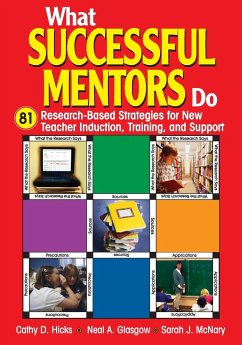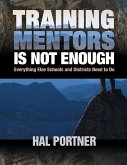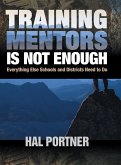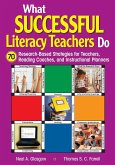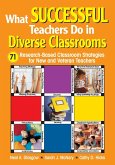Cathy D. Hicks, Neal A. Glasgow, Sarah J. Mcnary
What Successful Mentors Do
81 Research-Based Strategies for New Teacher Induction, Training, and Support
Cathy D. Hicks, Neal A. Glasgow, Sarah J. Mcnary
What Successful Mentors Do
81 Research-Based Strategies for New Teacher Induction, Training, and Support
- Broschiertes Buch
- Merkliste
- Auf die Merkliste
- Bewerten Bewerten
- Teilen
- Produkt teilen
- Produkterinnerung
- Produkterinnerung
Be the best mentor you can be with these state-of-the-art strategies! How can you relate all of your teaching experience to a new teacher? Working from decades of experience, the authors of this guide
Andere Kunden interessierten sich auch für
![Training Mentors Is Not Enough Training Mentors Is Not Enough]() Hal PortnerTraining Mentors Is Not Enough35,99 €
Hal PortnerTraining Mentors Is Not Enough35,99 €![Training Mentors Is Not Enough Training Mentors Is Not Enough]() Hal PortnerTraining Mentors Is Not Enough66,99 €
Hal PortnerTraining Mentors Is Not Enough66,99 €![What Successful Math Teachers Do, Grades 6-12 What Successful Math Teachers Do, Grades 6-12]() Alfred S. PosamentierWhat Successful Math Teachers Do, Grades 6-1240,99 €
Alfred S. PosamentierWhat Successful Math Teachers Do, Grades 6-1240,99 €![What Successful Literacy Teachers Do What Successful Literacy Teachers Do]() Neal A. GlasgowWhat Successful Literacy Teachers Do39,99 €
Neal A. GlasgowWhat Successful Literacy Teachers Do39,99 €![What Successful Teachers Do in Diverse Classrooms What Successful Teachers Do in Diverse Classrooms]() Neal A. GlasgowWhat Successful Teachers Do in Diverse Classrooms39,99 €
Neal A. GlasgowWhat Successful Teachers Do in Diverse Classrooms39,99 €![180 Days to Successful Writers 180 Days to Successful Writers]() Karen Donohue180 Days to Successful Writers45,99 €
Karen Donohue180 Days to Successful Writers45,99 €![How to Have a Successful Freelance Education Career How to Have a Successful Freelance Education Career]() Fe LutonHow to Have a Successful Freelance Education Career195,99 €
Fe LutonHow to Have a Successful Freelance Education Career195,99 €-
-
-
Be the best mentor you can be with these state-of-the-art strategies! How can you relate all of your teaching experience to a new teacher? Working from decades of experience, the authors of this guide
Hinweis: Dieser Artikel kann nur an eine deutsche Lieferadresse ausgeliefert werden.
Hinweis: Dieser Artikel kann nur an eine deutsche Lieferadresse ausgeliefert werden.
Produktdetails
- Produktdetails
- Verlag: Corwin
- Seitenzahl: 226
- Erscheinungstermin: 17. November 2004
- Englisch
- Abmessung: 254mm x 178mm x 12mm
- Gewicht: 434g
- ISBN-13: 9780761988878
- ISBN-10: 0761988874
- Artikelnr.: 21194678
- Herstellerkennzeichnung
- Libri GmbH
- Europaallee 1
- 36244 Bad Hersfeld
- gpsr@libri.de
- Verlag: Corwin
- Seitenzahl: 226
- Erscheinungstermin: 17. November 2004
- Englisch
- Abmessung: 254mm x 178mm x 12mm
- Gewicht: 434g
- ISBN-13: 9780761988878
- ISBN-10: 0761988874
- Artikelnr.: 21194678
- Herstellerkennzeichnung
- Libri GmbH
- Europaallee 1
- 36244 Bad Hersfeld
- gpsr@libri.de
Cathy D. Hicks most recently directed the Beginning Teacher Support and Assessment (BTSA) program for the San Dieguito Union High School District in Southern California. She oversaw an induction program supporting beginning teachers. She served for ten years on the executive board of the California Association of School Health Educators (CASHE) and has been an adjunct faculty member at California State University at San Marcos. She is co-author of five books: What Successful Teachers Do: 91 Research-Based Strategies for New and Veteran Teachers (2003); What Successful Mentors Do: 81 Research- Based Strategies for New Teacher Induction, Training, and Support (2005); What Successful Teachers Do in Inclusive Classrooms: 60 Research-Based Strategies That help Special Learns (2005); and What Successful Teachers Do in Diverse Classrooms: 71 Research-Based Strategies for New and Veteran Teachers (2006); What Successful Teachers Do: 101 Research-Based Strategies for new and Veteran Teachers (2009).She is a frequent presenter on educational topics both at the state and national level. She taught Physical Education and Health at both the middle and high school level for more than 25 years. During that time, she was involved in the California State Mentor Teacher Program and mentored new teachers in her district for more than 17 years. Her energy, enthusiasm, and passion for teaching and supporting new teachers reinforce the career path she chose in elementary school. She believes the most effective teachers are the ones who never settle for "good enough," but continue to grow, stretch, reflect, create, collaborate, and take risks throughout their teaching career.
Foreword - Don Rizzi
Preface
Acknowledgments
Introduction: The Mentoring Process Is a Journey, Not a Destination
1. Choosing the Best Strategies for Supporting New Teachers
2. Supporting New Teachers as They Interact and Collaborate With Students
3. Supporting New Teachers as They Organize Classroom Management and
Discipline Policies
4. Supporting New Teachers as They Develop Strategies for Managing
Curriculum and Pedagogy
5. Supporting New Teachers as They Develop, Use, and Evaluate Student
Assessment Instruments
6. Supporting New Teachers as They Develop Personal Teaching Styles and
Time Management Strategies
7. Supporting New Teachers as They Develop a Variety of Strategies for
Helping At-Risk and Special Needs Students Succeed
8. Supporting New Teachers as They Develop Strategies for Embracing and
Celebrating Diversity
9. Supporting New Teachers As They Develop Strategies for Working With New
Technologies
10. Supporting New Teachers as They Develop Positive Relationships With
Parents and Community
Index
Preface
Acknowledgments
Introduction: The Mentoring Process Is a Journey, Not a Destination
1. Choosing the Best Strategies for Supporting New Teachers
2. Supporting New Teachers as They Interact and Collaborate With Students
3. Supporting New Teachers as They Organize Classroom Management and
Discipline Policies
4. Supporting New Teachers as They Develop Strategies for Managing
Curriculum and Pedagogy
5. Supporting New Teachers as They Develop, Use, and Evaluate Student
Assessment Instruments
6. Supporting New Teachers as They Develop Personal Teaching Styles and
Time Management Strategies
7. Supporting New Teachers as They Develop a Variety of Strategies for
Helping At-Risk and Special Needs Students Succeed
8. Supporting New Teachers as They Develop Strategies for Embracing and
Celebrating Diversity
9. Supporting New Teachers As They Develop Strategies for Working With New
Technologies
10. Supporting New Teachers as They Develop Positive Relationships With
Parents and Community
Index
Foreword - Don Rizzi
Preface
Acknowledgments
Introduction: The Mentoring Process Is a Journey, Not a Destination
1. Choosing the Best Strategies for Supporting New Teachers
2. Supporting New Teachers as They Interact and Collaborate With Students
3. Supporting New Teachers as They Organize Classroom Management and
Discipline Policies
4. Supporting New Teachers as They Develop Strategies for Managing
Curriculum and Pedagogy
5. Supporting New Teachers as They Develop, Use, and Evaluate Student
Assessment Instruments
6. Supporting New Teachers as They Develop Personal Teaching Styles and
Time Management Strategies
7. Supporting New Teachers as They Develop a Variety of Strategies for
Helping At-Risk and Special Needs Students Succeed
8. Supporting New Teachers as They Develop Strategies for Embracing and
Celebrating Diversity
9. Supporting New Teachers As They Develop Strategies for Working With New
Technologies
10. Supporting New Teachers as They Develop Positive Relationships With
Parents and Community
Index
Preface
Acknowledgments
Introduction: The Mentoring Process Is a Journey, Not a Destination
1. Choosing the Best Strategies for Supporting New Teachers
2. Supporting New Teachers as They Interact and Collaborate With Students
3. Supporting New Teachers as They Organize Classroom Management and
Discipline Policies
4. Supporting New Teachers as They Develop Strategies for Managing
Curriculum and Pedagogy
5. Supporting New Teachers as They Develop, Use, and Evaluate Student
Assessment Instruments
6. Supporting New Teachers as They Develop Personal Teaching Styles and
Time Management Strategies
7. Supporting New Teachers as They Develop a Variety of Strategies for
Helping At-Risk and Special Needs Students Succeed
8. Supporting New Teachers as They Develop Strategies for Embracing and
Celebrating Diversity
9. Supporting New Teachers As They Develop Strategies for Working With New
Technologies
10. Supporting New Teachers as They Develop Positive Relationships With
Parents and Community
Index

